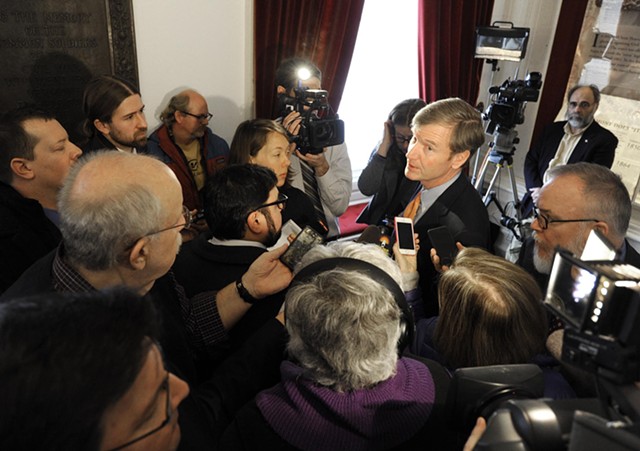Switch to the mobile version of this page.
Vermont's Independent Voice
- News
- Arts+Culture
- Home+Design
- Food
- Cannabis
- Music
- On Screen
- Events
- Jobs
- Obituaries
- Classifieds
- Personals
Browse News
Departments
Browse Arts + Culture
View All
local resources
Browse Food + Drink
View All
Browse Cannabis
View All
-
Culture

'Cannasations' Podcaster Kris Brown Aims to 'Humanize'…
-
True 802

A Burlington Cannabis Shop Plans to Host…
-
Business

Judge Tosses Burlington Cannabiz Owner's Lawsuit
-
Health + Fitness

Vermont's Cannabis Nurse Hotline Answers Health Questions…
-
Business

Waterbury Couple Buy Rare Vermont Cannabis License
Browse Music
View All
Browse On Screen
Browse Events
Browse Classifieds
Browse Personals
-

If you're looking for "I Spys," dating or LTRs, this is your scene.
View Profiles
Special Reports
Pubs+More
Wednesday, April 13, 2016
News / U.S. Politics Milne Accuses Leahy of Flip-Flopping on Superdelegate Stance
Posted By Paul Heintz on Wed, Apr 13, 2016 at 6:31 PM
A potential challenger to Sen. Patrick Leahy (D-Vt.) accused him Wednesday of bowing to political pressure and backing off his promise to vote for Hillary Clinton this summer at the Democratic National Convention.
A longtime Clinton supporter, Leahy indicated at a February press conference that he would cast his superdelegate vote for the former secretary of state — even if Sen. Bernie Sanders (I-Vt.) won Vermont’s primary. A political aide walked that position back in March and said Leahy would vote for whichever presidential candidate won a majority of pledged delegates. The aide, Carolyn Dwyer, has since claimed that reporters were confused and had misinterpreted Leahy’s comments.
Pomfret Republican Scott Milne, who has been eyeing a challenge to Leahy, sees it differently.
“Team Leahy’s flip-flop on his promise to Secretary Clinton that he was going to support and vote for her at the convention — just because the going’s getting a little tough in Vermont — is an insight into the way Washington works, the way Washington is so dysfunctional,” Milne said Wednesday. “I think it screams out that Vermont can be a part of fixing Washington by replacing our U.S. senator in 2016.”
Milne, who nearly defeated Gov. Peter Shumlin in the 2014 election, has not formally entered the 2016 Senate race. He said he intends to reveal his plans in May. But the travel agency executive’s criticism of Leahy has grown increasingly strident in recent months.
“I grew up on a dirt road in Orange County, and there’s a saying: If it looks like a pile of dung and it smells like a pile of dung, then it probably is a pile a dung,” Milne said Wednesday, referring to Leahy’s change in position. “What his campaign manager said in the press is completely implausible. It’s Washington political talk.”
Dwyer continued to maintain Wednesday that her boss had been consistent on the matter.
“There has been some confusion on this issue,” she said in an email. “Sen. Leahy’s personal support is with Secretary Clinton. His unpledged delegate vote will go to the candidate with the most pledged delegates at the national convention.”
Leahy’s position reemerged as an issue last week after the liberal advocacy group Rights & Democracy circulated a petition calling on Leahy and his fellow Vermont superdelegates to vote for Sanders at the convention. By Wednesday afternoon, the petition had generated nearly 5,000 signatures.
Vermont’s senior senator was pressed on his superdelegate vote at a February 15 press conference in the Old North End — a week after Sanders won the New Hampshire primary and two weeks before he won the Vermont primary. Leahy told reporters then that he had endorsed Clinton long ago and that he would “never break my word.”
Asked specifically whether he would change his superdelegate vote for any reason — other than Clinton releasing him to vote for another candidate — Leahy referred to his previous answer about not breaking his word.
Later in the press conference, Vermont Public Radio’s Taylor Dobbs asked whether the senator would be flouting the will of his constituents if Sanders won Vermont and Leahy nevertheless cast his superdelegate vote for Clinton.
“No,” Leahy responded. “I’m voting my conscience, and I’m voting my commitments, and I made sure everybody knows what my conscience and what my commitments say.”
Here’s a full transcript of the relevant portions of the press conference:
Queried at the time about the switcheroo, Dwyer wrote Seven Days, “I understand the confusion and why someone would make an assumption about his delegate vote. That’s why we have clarified.” In a later email, she maintained, “His position has not changed.”
In an interview this week with VTDigger.org’s Mark Johnson, Dwyer appeared to blame both her boss and the press for the alleged “confusion.”
“He was not clear, and people interpreted freely,” she told Johnson.
Seven Days asked Dwyer Wednesday how reporters could have interpreted Leahy’s February 15 comments any differently; why he didn’t say then that he would back the pledged delegate leader; and whether he had ever articulated that position prior to March. In response, Dwyer referred to her previous statements.
Vermont news organizations have covered Leahy’s evolution in a variety of ways.
Writing Sunday in the Burlington Free Press, reporter Dan D’Ambrosio noted that Leahy had said during a February interview in Washington, D.C., “that casting his superdelegate vote for Clinton was a matter of ‘conscience and commitment.’” But the paper appeared to buy Dwyer’s argument that the senator was “clarifying” his position — not changing it. It ran with the front-page headline, “Leahy Clarifies Superdelegate Voting Plans.”
Dobbs, of VPR, wrote Tuesday that Leahy had “changed his stance on how he will cast his superdelegate vote” since the February press conference. His piece was originally headlined, “In Reversal, Leahy’s Campaign Says His Support Will Follow Majority.”
The words “in reversal” were later removed, as VPR noted in an update to the story. News director John Dillon said Dwyer had called to complain about the piece.
“I took reversal out of the headline because, on reflection, it wasn’t quite accurate,” Dillon explained. “A reversal is a complete change in direction. In this case, a true reversal would be Leahy saying he would switch his support and vote for Sanders.”
In his remarks Wednesday, Milne didn’t restrict his criticism to Leahy’s shifting superdelegate position. He also accused the senator, who was first elected to the office in 1974, of being out of touch with Vermont.
“He shows up every weekend and talks about his farm in Middlesex, yet he’s been living in Virginia since 1975,” Milne said, referring to Leahy’s houses in Vermont and McLean, Va.
In response, Dwyer referred to Milne’s famous flub during a 2014 debate — later mocked by Comedy Central’s John Stewart — when Milne said he was part of his family’s third generation born in Vermont, before correcting himself and noting that he had actually been born in Brooklyn.
“Last time he ran, Mr. Milne got confused about what state he was actually born in (correct answer: New York),” Dwyer wrote. “Debating residency issues with him is probably not a fair fight.”
A longtime Clinton supporter, Leahy indicated at a February press conference that he would cast his superdelegate vote for the former secretary of state — even if Sen. Bernie Sanders (I-Vt.) won Vermont’s primary. A political aide walked that position back in March and said Leahy would vote for whichever presidential candidate won a majority of pledged delegates. The aide, Carolyn Dwyer, has since claimed that reporters were confused and had misinterpreted Leahy’s comments.
Pomfret Republican Scott Milne, who has been eyeing a challenge to Leahy, sees it differently.
“Team Leahy’s flip-flop on his promise to Secretary Clinton that he was going to support and vote for her at the convention — just because the going’s getting a little tough in Vermont — is an insight into the way Washington works, the way Washington is so dysfunctional,” Milne said Wednesday. “I think it screams out that Vermont can be a part of fixing Washington by replacing our U.S. senator in 2016.”
Milne, who nearly defeated Gov. Peter Shumlin in the 2014 election, has not formally entered the 2016 Senate race. He said he intends to reveal his plans in May. But the travel agency executive’s criticism of Leahy has grown increasingly strident in recent months.
“I grew up on a dirt road in Orange County, and there’s a saying: If it looks like a pile of dung and it smells like a pile of dung, then it probably is a pile a dung,” Milne said Wednesday, referring to Leahy’s change in position. “What his campaign manager said in the press is completely implausible. It’s Washington political talk.”
Dwyer continued to maintain Wednesday that her boss had been consistent on the matter.
“There has been some confusion on this issue,” she said in an email. “Sen. Leahy’s personal support is with Secretary Clinton. His unpledged delegate vote will go to the candidate with the most pledged delegates at the national convention.”
Leahy’s position reemerged as an issue last week after the liberal advocacy group Rights & Democracy circulated a petition calling on Leahy and his fellow Vermont superdelegates to vote for Sanders at the convention. By Wednesday afternoon, the petition had generated nearly 5,000 signatures.
Vermont’s senior senator was pressed on his superdelegate vote at a February 15 press conference in the Old North End — a week after Sanders won the New Hampshire primary and two weeks before he won the Vermont primary. Leahy told reporters then that he had endorsed Clinton long ago and that he would “never break my word.”
Asked specifically whether he would change his superdelegate vote for any reason — other than Clinton releasing him to vote for another candidate — Leahy referred to his previous answer about not breaking his word.
Later in the press conference, Vermont Public Radio’s Taylor Dobbs asked whether the senator would be flouting the will of his constituents if Sanders won Vermont and Leahy nevertheless cast his superdelegate vote for Clinton.
“No,” Leahy responded. “I’m voting my conscience, and I’m voting my commitments, and I made sure everybody knows what my conscience and what my commitments say.”
Here’s a full transcript of the relevant portions of the press conference:
Seven Days: “Do you have any second thoughts about endorsing Secretary Clinton for president now that you’re seeing your fellow Vermont senator doing so well?”Leahy’s position appeared to shift shortly after Sanders won the Vermont primary with 86 percent of the vote. In an email to the Associated Press’ Dave Gram, Dwyer wrote that Leahy had “given his personal support to [Secretary] Clinton. His delegate vote will go to the candidate with the most pledged delegates at [the] Convention.”
Sen. Patrick Leahy: “You know, the Leahys have been in Vermont since the 1800s. One of the touchstones of our family — I learned it from my grandparents, I learned it from my parents and I’ve tried to teach my children – is you keep your word. Long before Sen. Sanders ever said he was going to run, I told and urged then-secretary Clinton to run and told her I’d support her. I think anybody who knows me — anybody who knows my years as state’s attorney or my years in the Senate — know that I never break my word. And certainly Sen. Sanders would never ask me to break my word, nor has he. If Sen. Sanders is the nominee, I’ll happily campaign all over the country for him. We’ve worked together. He’s a good friend of mine. Our wives are friends, and I would — I’m proud of a lot of the issues he’s raised. But, first and foremost, I always keep my word. Nobody — especially Sen. Sanders — would ever ask me to break my word.”
Seven Days: “So to be clear, you wouldn’t change your superdelegate vote unless — unless she released you.”
Leahy: “My answer is what I — my answer is what I said.”
….
Vermont Public Radio’s Taylor Dobbs: “If Sen. Sanders wins the majority of Democratic votes here in Vermont and then you go to the convention and vote for Hillary, are you voting against your constituents?”
Leahy: “No. I’m voting my conscience, and I’m voting my commitments, and I made sure everybody knows what my conscience and what my commitments say. But you know, by the time we get to the convention, I have a feeling we’re going to know which one is going to have the majority, and whoever is nominated in the convention – if either of them – I would be happy to go and campaign for them.”
Queried at the time about the switcheroo, Dwyer wrote Seven Days, “I understand the confusion and why someone would make an assumption about his delegate vote. That’s why we have clarified.” In a later email, she maintained, “His position has not changed.”
In an interview this week with VTDigger.org’s Mark Johnson, Dwyer appeared to blame both her boss and the press for the alleged “confusion.”
“He was not clear, and people interpreted freely,” she told Johnson.
Seven Days asked Dwyer Wednesday how reporters could have interpreted Leahy’s February 15 comments any differently; why he didn’t say then that he would back the pledged delegate leader; and whether he had ever articulated that position prior to March. In response, Dwyer referred to her previous statements.
Vermont news organizations have covered Leahy’s evolution in a variety of ways.
Writing Sunday in the Burlington Free Press, reporter Dan D’Ambrosio noted that Leahy had said during a February interview in Washington, D.C., “that casting his superdelegate vote for Clinton was a matter of ‘conscience and commitment.’” But the paper appeared to buy Dwyer’s argument that the senator was “clarifying” his position — not changing it. It ran with the front-page headline, “Leahy Clarifies Superdelegate Voting Plans.”
Dobbs, of VPR, wrote Tuesday that Leahy had “changed his stance on how he will cast his superdelegate vote” since the February press conference. His piece was originally headlined, “In Reversal, Leahy’s Campaign Says His Support Will Follow Majority.”
The words “in reversal” were later removed, as VPR noted in an update to the story. News director John Dillon said Dwyer had called to complain about the piece.
“I took reversal out of the headline because, on reflection, it wasn’t quite accurate,” Dillon explained. “A reversal is a complete change in direction. In this case, a true reversal would be Leahy saying he would switch his support and vote for Sanders.”
In his remarks Wednesday, Milne didn’t restrict his criticism to Leahy’s shifting superdelegate position. He also accused the senator, who was first elected to the office in 1974, of being out of touch with Vermont.
“He shows up every weekend and talks about his farm in Middlesex, yet he’s been living in Virginia since 1975,” Milne said, referring to Leahy’s houses in Vermont and McLean, Va.
In response, Dwyer referred to Milne’s famous flub during a 2014 debate — later mocked by Comedy Central’s John Stewart — when Milne said he was part of his family’s third generation born in Vermont, before correcting himself and noting that he had actually been born in Brooklyn.
“Last time he ran, Mr. Milne got confused about what state he was actually born in (correct answer: New York),” Dwyer wrote. “Debating residency issues with him is probably not a fair fight.”
Tags: Senator, Patrick Leahy, Scott Milne, Bernie Sanders, Hillary Clinton, presidential campaign, superdelegate, Recommended Reading, Image, Web Only
Comments (9)
Showing 1-9 of 9
Comments are closed.
Since 2014, Seven Days has allowed readers to comment on all stories posted on our website. While we’ve appreciated the suggestions and insights, the time has come to shut them down — at least temporarily.
While we champion free speech, facts are a matter of life and death during the coronavirus pandemic, and right now Seven Days is prioritizing the production of responsible journalism over moderating online debates between readers.
To criticize, correct or praise our reporting, please send us a letter to the editor. Or send us a tip. We’ll check it out and report the results.
Online comments may return when we have better tech tools for managing them. Thanks for reading.
About The Author

Paul Heintz
Bio:
Paul Heintz was part of the Seven Days news team from 2012 to 2020. He served as political editor and wrote the "Fair Game" political column before becoming a staff writer.
Paul Heintz was part of the Seven Days news team from 2012 to 2020. He served as political editor and wrote the "Fair Game" political column before becoming a staff writer.












































